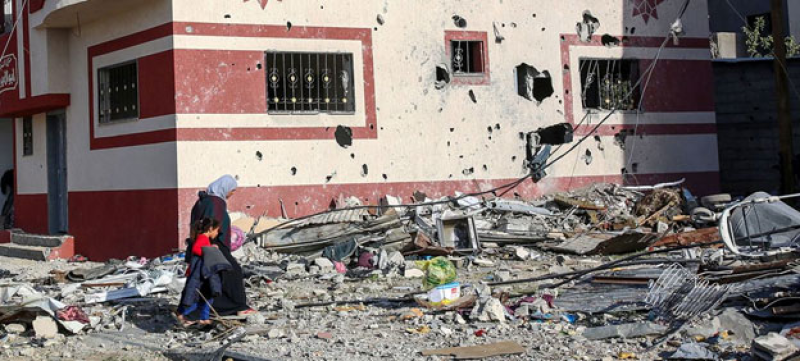- India Sees 9% Drop in Foreign Tourists as Bangladesh Visits Plunge |
- Dhaka Urges Restraint in Pakistan-Afghan War |
- Guterres Urges Action on Safe Migration Pact |
- OpenAI Raises $110B in Amazon-Led Funding |
- Puppet show enchants Children as Boi Mela comes alive on day 2 |
UN Staff Revolt Amid Gaza Crisis and Reform Backlash

A woman and child walk through the heavily bombed town of Khuza’a in the Gaza Strip.
In Geneva, nearly 600 UN staff based at the UN Office convened an Extraordinary Staff Union meeting on 24 July 2025, unanimously passing a motion of no confidence in the UN80 reform initiative, Secretary-General António Guterres, and Under-Secretary-General Guy Ryder—with no abstentions and no dissenting voices.
Meanwhile, Gaza is being flattened.
The war has become the deadliest ever for UN personnel: more than 200 UNRWA staff have been killed since October 2023. In 2024 alone, 116 UN staff members with the United Nations Palestine Refugee Agency were killed, bringing the total to 263 staff fatalities since the war began (UN Staff Union Committee – Question of Palestine).
Aid starvation is mounting. UN agencies warn Gaza is on the brink of mass starvation, with children visibly wasting away and even aid workers queuing for food (Amnesty International). Reports describe scenes of “walking corpses” due to extreme shortages of food, water, and medicine (The Times).
“As mass starvation spreads across Gaza, our colleagues and those we serve are wasting away.” – Amnesty International
“‘Walking corpses’ haunt Gaza streets”: UN says children are dying of starvation, while India urges emergency relief – (The Economic Times)
Despite this reality, famine has not been officially declared—due to access constraints and the politicization of humanitarian data (Associated Press).
The UN Office for the Coordination of Humanitarian Affairs (OCHA) confirms the collapse of health and water services, especially in Rafah (OCHA Flash Update #165).
Enter UN80: Reform or Regression?
Launched in mid-2025 to mark the UN’s 80th anniversary, UN80 is a sweeping internal reform promoted under the guise of “modernization” and “efficiency.” But the initiative cuts junior-level positions, concentrates decision-making in the Secretary-General’s office, and accelerates centralization—without transparent evaluation of past reforms or independent oversight (IPI Commentary).
The UN’s own Joint Inspection Unit (JIU) warned in a 2023 report that the growing reliance on affiliate workers and non-staff consultants has undermined accountability. Earlier reports criticised prior reforms for centralising authority without improving transparency or including field-level voices (JIU/REP/2023/8).
A System Functioning as Designed?
This is not merely a system in crisis—it is a system functioning exactly as designed: to protect its reputation, manage political risk, and suppress internal dissent.
It prioritizes control over service, and branding over substance.
Meanwhile, global crises—from Ukraine to Sudan—are exposing the UN’s deepening credibility problem. A 2022 High-Level Committee on Management (HLCM) report acknowledged rising internal distrust and institutional fatigue (UN CEB HLCM Report).
What Now?
We need truth-tellers inside the system.
Staff who document abuses, analysts who refuse to whitewash data, and leaders who resist sanitizing reality to appease donors. These are the individuals who can restore integrity to institutions that have lost their way.
There is a moral precedent in the figure of Job—who did not suffer because he failed, but because he refused to lie. In the face of collapse, he stood firm in truth. That refusal—not obedience—sustained him.
Not every fight is winnable. But silence?
That’s not an option.
As Martin Luther King Jr. said:
“In the end, we will remember not the words of our enemies, but the silence of our friends.”
If the UN is to survive the 21st century, it must reclaim its soul. That begins with truth.
Not PR. Not spin.
Truth that costs something.
Stephanie Hodge is an international evaluator and former UN advisor who has worked in over 140 countries. She served at UNDP (1994–1996, 1999–2004) and UNICEF (2008–2014), and writes on governance, multilateral reform, and climate equity.

